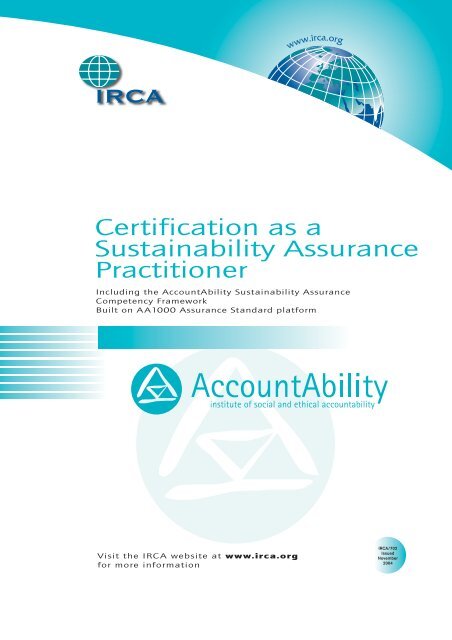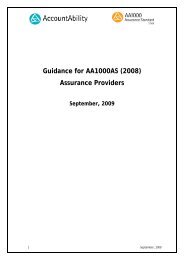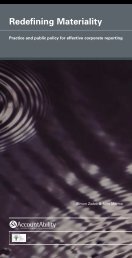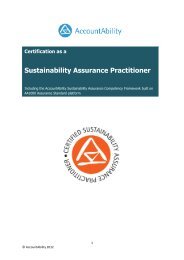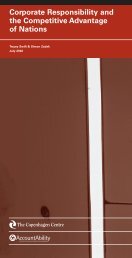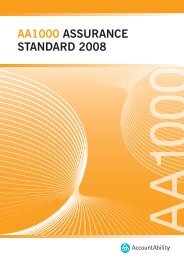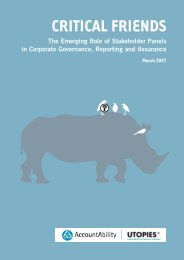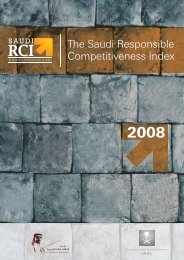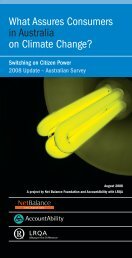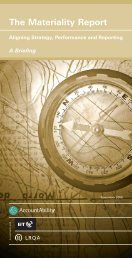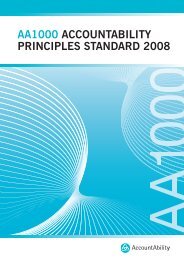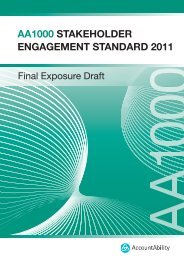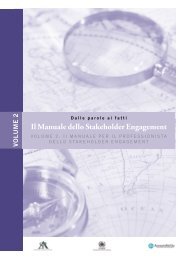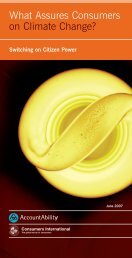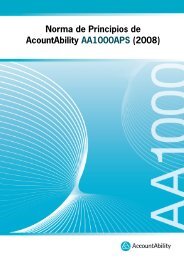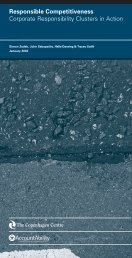Certification as a Sustainability Assurance Practitioner - AccountAbility
Certification as a Sustainability Assurance Practitioner - AccountAbility
Certification as a Sustainability Assurance Practitioner - AccountAbility
Create successful ePaper yourself
Turn your PDF publications into a flip-book with our unique Google optimized e-Paper software.
<strong>Certification</strong> <strong>as</strong> a<br />
<strong>Sustainability</strong> <strong>Assurance</strong><br />
<strong>Practitioner</strong><br />
Including the <strong>AccountAbility</strong> <strong>Sustainability</strong> <strong>Assurance</strong><br />
Competency Framework<br />
Built on AA1000 <strong>Assurance</strong> Standard platform<br />
Visit the IRCA website at www.irca.org<br />
for more information<br />
IRCA/702<br />
Issued<br />
November<br />
2004
<strong>Certification</strong> <strong>as</strong> a <strong>Sustainability</strong> <strong>Assurance</strong> <strong>Practitioner</strong><br />
Table of Contents<br />
1. IRCA and <strong>AccountAbility</strong> 3<br />
2. Introduction to the <strong>Sustainability</strong> <strong>Assurance</strong> <strong>Practitioner</strong> Program 7<br />
3. Who can apply – certification grades 10<br />
4. Requirements for Initial <strong>Certification</strong> 12<br />
5. Applying for Initial <strong>Certification</strong> 13<br />
6. Fees 17<br />
7. Requirements for Renewal of <strong>Certification</strong> 18<br />
8. How to Regrade 21<br />
9. Other Information 22<br />
Appendix I - Glossary 24<br />
Appendix II - Code of Practice 25<br />
Appendix III – <strong>Sustainability</strong> <strong>Assurance</strong> Competency Framework<br />
i<br />
The information detailed within this document w<strong>as</strong> correct at time of publication. For<br />
more details about this program and other services we provide, we advise you to see the<br />
IRCA website at www.irca.org.<br />
Copyright IRCA 2004<br />
All rights reserved. No part of this publication may be reproduced, stored in a retrieval<br />
system or transmitted in any form or by any means - electronic, mechanical,<br />
photocopying, recording or otherwise - without prior permission of the IQA International<br />
Register of Certificated Auditors (IRCA).<br />
1 of 26<br />
IRCA/702 Issued November 2004
<strong>Certification</strong> <strong>as</strong> a <strong>Sustainability</strong> <strong>Assurance</strong> <strong>Practitioner</strong><br />
2 of 26<br />
IRCA/702 Issued November 2004
<strong>Certification</strong> <strong>as</strong> a <strong>Sustainability</strong> <strong>Assurance</strong> <strong>Practitioner</strong><br />
1. IRCA and <strong>AccountAbility</strong><br />
IRCA and Auditor <strong>Certification</strong><br />
History:<br />
The International Register of Certificated Auditors (IRCA) began certifying auditors in 1984.<br />
It w<strong>as</strong> set up <strong>as</strong> part of an initiative by the UK government to make business and industry<br />
more competitive. The aim of this initiative w<strong>as</strong> to achieve efficiencies by reducing the costs<br />
of supplier audits by replacing them with fewer third party audits. Each third party audit of a<br />
supplier would then be accepted and recognized by all customers of that supplier.<br />
In addition to IRCA, the other bodies involved in this new structure included an accreditation<br />
body (now UKAS), a national standards creation body (BSI Standards), and a number of<br />
certification bodies. The quality management standard used w<strong>as</strong> the British standard; BS<br />
5750, which later became ISO 9001.<br />
This quality infr<strong>as</strong>tructure proved to be extremely successful and is now recognized<br />
worldwide to be the most effective and most commonly used method for <strong>as</strong>suring the<br />
quality of supplier organizations. This same structure is now used in other contexts, e.g. to<br />
<strong>as</strong>sure the compliance of organizations’ management systems to occupational health &<br />
safety, food safety and environmental requirements. But whatever the context, because the<br />
structure relies heavily on competent auditors and consultants, the role played by IRCA h<strong>as</strong><br />
been essential to its success.<br />
During the years since its inception, IRCA h<strong>as</strong> earned a reputation for integrity and for<br />
adding value. Most other auditor certification bodies have adopted the evaluation and<br />
certification methods developed and used by IRCA. Although most countries now offer<br />
alternatives to IRCA through their own national auditor certification programs, IRCA<br />
certification remains internationally <strong>as</strong> popular <strong>as</strong> ever. Around 27,000 auditors have been<br />
awarded certification since 1984, and over 100 countries are currently represented on the<br />
IRCA register. IRCA is the only auditor certification body that h<strong>as</strong> international recognition<br />
and remains the certification that supplier organizations, certification bodies and auditors<br />
value most.<br />
IRCA training:<br />
IRCA certification of auditor training courses is recognized and valued internationally.<br />
Although developed originally to support auditor certification, IRCA h<strong>as</strong> evolved certification<br />
of training to become an independent activity successful in its own right. Originally designed<br />
for auditors wishing to become certified, the courses proved very popular with students who<br />
were seeking information on quality, environmental and health & safety management for a<br />
variety of re<strong>as</strong>ons. Now, only a small minority of students attending these courses are<br />
auditors. Training organizations in many parts of the world regard IRCA certification <strong>as</strong> an<br />
essential requirement for trading. The number of courses IRCA offers h<strong>as</strong> incre<strong>as</strong>ed to cover<br />
a wide range of applications, and continues to expand <strong>as</strong> Training Organizations demand<br />
certification for an incre<strong>as</strong>ing range of courses. Around 60,000 students a year attend IRCA<br />
certified training in all parts of the world.<br />
3 of 26<br />
IRCA/702 Issued November 2004
<strong>Certification</strong> <strong>as</strong> a <strong>Sustainability</strong> <strong>Assurance</strong> <strong>Practitioner</strong><br />
Links with the IQA:<br />
IRCA is an operationally separate division of the Institute of Quality <strong>Assurance</strong>. The IQA in<br />
its own right is recognized worldwide <strong>as</strong> one of the international champions of quality.<br />
Together, in their respective roles, IRCA and the IQA provide a successful contribution to<br />
business and industry b<strong>as</strong>ed on integrity, absolute impartiality, and adding value to the<br />
business process.<br />
4 of 26<br />
IRCA/702 Issued November 2004
<strong>Certification</strong> <strong>as</strong> a <strong>Sustainability</strong> <strong>Assurance</strong> <strong>Practitioner</strong><br />
<strong>AccountAbility</strong><br />
Mission:<br />
<strong>AccountAbility</strong> is an international, not-for-profit, professional institute for business, nongovernmental<br />
organizations, public sector organizations and individuals committed to<br />
enhancing the performance of organizations and to developing the competencies of<br />
individuals working in social and ethical accountability and sustainable development.<br />
<strong>AccountAbility</strong> is dedicated to promoting accountability for sustainable development and<br />
enhancing the performance of organizations and developing the competencies of individuals<br />
in social and ethical accountability and sustainable development by:<br />
• Creating a credible <strong>as</strong>surance standard and underlying accountability framework<br />
• Providing quality professional development and certification<br />
• Advocating an enabling public policy environment for organizational accountability<br />
• Developing innovative 'ide<strong>as</strong>-for-action' through research and practise.<br />
<strong>AccountAbility</strong>’s commitment to learning - governance structure:<br />
The AA1000 Series is the tip of an iceberg, which rests on a<br />
multi-stakeholder<br />
governance structure,<br />
including members, a<br />
technical committee, and<br />
council and operating board.<br />
This structure allows for and<br />
supports multi-stakeholder<br />
dialogue processes that<br />
underpin all development<br />
work relating to the AA1000 Series. Developing the AA1000 Series is an ongoing t<strong>as</strong>k and<br />
one that is continuously subject to refinement and additions reflecting latest developments<br />
in the field and feedback from our stakeholders.<br />
The AA1000 <strong>Assurance</strong> Standard:<br />
The AA1000 <strong>Assurance</strong> Standard (AA1000AS) w<strong>as</strong> launched <strong>as</strong> the first Module because the<br />
need for an <strong>as</strong>surance framework w<strong>as</strong> greatest, b<strong>as</strong>ed on stakeholder feedback. The<br />
AA1000 <strong>Assurance</strong> Standard is the world's first <strong>as</strong>surance standard for social and<br />
sustainability reporting with a stakeholder engagement process at its heart. Following an<br />
extensive consultation process the AA1000 <strong>Assurance</strong> Standard w<strong>as</strong> launched on March<br />
25th, 2003.<br />
The AA1000 AS is a generally applicable standard for <strong>as</strong>sessing, attesting to, and<br />
strengthening the credibility and quality of organizations’ sustainability reporting, and<br />
underlying processes, systems and competencies. It provides guidance on key elements of<br />
the <strong>Assurance</strong> process.<br />
It is specifically designed to be consistent with, and to enhance, the Global Reporting<br />
Initiative <strong>Sustainability</strong> Reporting Guidelines, <strong>as</strong> well <strong>as</strong> other related standards. The<br />
5 of 26<br />
IRCA/702 Issued November 2004
<strong>Certification</strong> <strong>as</strong> a <strong>Sustainability</strong> <strong>Assurance</strong> <strong>Practitioner</strong><br />
AA1000 <strong>Assurance</strong> Standard is, moreover, designed to complement and enhance the use of<br />
specialist <strong>Assurance</strong> standards and guidelines for the purposes of sustainability Reporting,<br />
e.g. factory-b<strong>as</strong>ed labour compliance audits, employee diversity audits and carbon<br />
emissions audits. Therefore this program incorporates other specialist standards and<br />
guidelines.<br />
A range of materials and forums support the AA1000 Series such <strong>as</strong> Guidance Notes and<br />
<strong>Practitioner</strong> 2 <strong>Practitioner</strong> Notes. In addition, a number of publications and research reports<br />
directly related to AA1000 Series are available and further supporting materials will be<br />
produced in future.<br />
6 of 26<br />
IRCA/702 Issued November 2004
<strong>Certification</strong> <strong>as</strong> a <strong>Sustainability</strong> <strong>Assurance</strong> <strong>Practitioner</strong><br />
2. Introduction to the <strong>Sustainability</strong> <strong>Assurance</strong> <strong>Practitioner</strong><br />
Program<br />
Why develop this program<br />
There is an incre<strong>as</strong>ing need for <strong>as</strong>surance of non-financial and financial information <strong>as</strong> part of<br />
an organization’s performance against sustainable development commitments, policies and<br />
strategies. This is relevant to secure quality internally, and to provide credible information to<br />
interested stakeholders externally. This is important to those stakeholders concerned with<br />
specific social and environmental <strong>as</strong>pects of performance, and to those more interested in the<br />
impact of non-financial <strong>as</strong>pects on financial performance and valuations.<br />
<strong>AccountAbility</strong> developed the AA1000 <strong>Assurance</strong> Standard to provide a credible foundation for<br />
sustainability <strong>as</strong>surance, combining the best from both traditional auditing methodologies and<br />
leading edge practice in stakeholder engagement and indicator development. Since its launch in<br />
early 2003, it h<strong>as</strong> underpinned the external <strong>as</strong>surance of a growing number of sustainability<br />
reports, <strong>as</strong> well <strong>as</strong> being used internally for quality <strong>as</strong>surance. It is incre<strong>as</strong>ingly used in<br />
conjunction with related standards such <strong>as</strong> the GRI <strong>Sustainability</strong> Reporting Guidelines and the<br />
ISAE3000 non-financial <strong>as</strong>surance guidelines provided by the International <strong>Assurance</strong> and<br />
Auditing Standards Board; a positive sign of standards convergence.<br />
There remains a gap, however, in standards governing the emerging profession of<br />
sustainability <strong>as</strong>surance practitioners. There is growing confusion <strong>as</strong> to what experience is<br />
relevant and how best to judge individual competence, often <strong>as</strong> part of <strong>as</strong>surance teams. As a<br />
result, the growth of sustainability <strong>as</strong>surance h<strong>as</strong> been constrained, with corresponding<br />
damage to quality and credibility.<br />
Why the partnership<br />
<strong>AccountAbility</strong> and IRCA, recognizing the need, have established a partnership to provide a<br />
professional qualification in sustainability <strong>as</strong>surance. This partnership is designed to combine<br />
the core competencies of each organization: <strong>AccountAbility</strong>’s expertise in sustainability<br />
<strong>as</strong>surance and IRCA’s expertise in building and implementing personnel certification programs.<br />
Within the program:<br />
• IRCA is responsible for operating worldwide a cost-effective certification process<br />
described in this document;<br />
• <strong>AccountAbility</strong> is responsible for defining practitioner competency requirements seen<br />
in Appendix III;<br />
• <strong>AccountAbility</strong> contributes to oversight of the implementation of the program<br />
through its position on IRCA’s <strong>Certification</strong> Committee and through its independent<br />
oversight of the certification process;<br />
• <strong>AccountAbility</strong> oversees the deployment of technical evaluators, including telephone<br />
interviewers.<br />
7 of 26<br />
IRCA/702 Issued November 2004
<strong>Certification</strong> <strong>as</strong> a <strong>Sustainability</strong> <strong>Assurance</strong> <strong>Practitioner</strong><br />
Aim of the program<br />
The <strong>Sustainability</strong> <strong>Assurance</strong> <strong>Practitioner</strong> program aims to:<br />
• Enable practitioners to develop, validate and communicate their competence in a<br />
systematic manner.<br />
• Make it e<strong>as</strong>ier for organizations to identify credible <strong>as</strong>surance expertise.<br />
• Improve confidence for those seeking <strong>as</strong>surance in the expertise of professionals<br />
engaged to <strong>as</strong>sess and p<strong>as</strong>s judgement on their behalf.<br />
• Develop a more systematic understanding of key competencies for providing<br />
effective <strong>as</strong>surance, and so establish a b<strong>as</strong>is for informing this and other standards in<br />
the future.<br />
This <strong>Sustainability</strong> <strong>Assurance</strong> <strong>Practitioner</strong> program is for practitioners in sustainability<br />
<strong>as</strong>surance, both internal and external to the organization whose performance is being<br />
<strong>as</strong>sured. In addition, we acknowledge the need for a broader range of practitioners to<br />
understand the b<strong>as</strong>ics of <strong>as</strong>surance, including those responsible for preparing sustainability<br />
reports, managing and commissioning external <strong>as</strong>surance processes, and stakeholders<br />
seeking to judge the quality of an <strong>as</strong>surance statement and underlying process. For these<br />
latter groups, the Associate certification status is particularly appropriate.<br />
This program is for all practitioners in sustainability <strong>as</strong>surance, including but not restricted to<br />
those explicitly using the AA1000 <strong>Assurance</strong> Standard. That said, the Competency Framework<br />
h<strong>as</strong> been built on an AA1000 <strong>Assurance</strong> Standard platform, and can be best interpreted when<br />
used in conjunction with the Standard. In particular, the AA1000 <strong>Assurance</strong> Standard requires<br />
external <strong>as</strong>surance <strong>as</strong>signments to include a publicly available statement of <strong>as</strong>surance provider<br />
competencies, both individual and organizational.<br />
Role/ Status of individual practitioner certification<br />
<strong>AccountAbility</strong> and IRCA appreciate the considerable challenge in delivering an effective<br />
practitioner certification program in this field. <strong>Assurance</strong> practitioners approach their work<br />
with a range of relevant experience and qualifications, making the codification of what is<br />
necessary particularly difficult, all the more so given the diverse circumstances in which<br />
<strong>as</strong>surance is undertaken; often requiring multi-disciplinary teams. Moreover, the nonfinancial<br />
or sustainability <strong>as</strong>surance fields are rapidly evolving, <strong>as</strong> corporate governance and<br />
other legislation and potential for litigation becomes more relevant, and with continual<br />
improvement of the AA1000 <strong>Assurance</strong> Standard, the GRI Guidelines and other relevant<br />
standards and frameworks.<br />
Continuing Development of the Competency Framework and this program<br />
An extensive consultation process h<strong>as</strong> informed the development of both the Competency<br />
Framework (see Appendix III) and the certification process described in this document.<br />
Defining the technical competencies for specific <strong>as</strong>pects of sustainable development h<strong>as</strong> been a<br />
particularly difficult issue to resolve. The decision, <strong>as</strong> reflected in the Competency Framework,<br />
h<strong>as</strong> been to focus on a general appreciation of sustainable development and skills in making<br />
judgements about technical matters, particularly through demonstrable skills and experience in<br />
stakeholder engagement.<br />
8 of 26<br />
IRCA/702 Issued November 2004
<strong>Certification</strong> <strong>as</strong> a <strong>Sustainability</strong> <strong>Assurance</strong> <strong>Practitioner</strong><br />
The outcome of the consultation process is this first version of the practitioner program<br />
outlining the b<strong>as</strong>ic competencies a practitioner requires to operate within the current<br />
environment. From this foundation we anticipate that this program will continuously develop in<br />
sophistication and appropriateness <strong>as</strong> a result of our experience gained in its operation; in the<br />
development of the field; and from feedback from key stakeholders. On this b<strong>as</strong>is we are<br />
committed to the ongoing development of this program informed by stakeholder expectations.<br />
It is anticipated that the competency requirements and the continuous professional<br />
development criteria of the program will be reviewed for the first time one year after the<br />
program h<strong>as</strong> been implemented. Therefore, to support advances in the area of sustainability<br />
<strong>as</strong>surance competence your opinions are valuable to us.<br />
We welcome and look forward to your feedback at www.irca.org or at<br />
www.accountability.org.uk.<br />
9 of 26<br />
IRCA/702 Issued November 2004
<strong>Certification</strong> <strong>as</strong> a <strong>Sustainability</strong> <strong>Assurance</strong> <strong>Practitioner</strong><br />
3. Who can apply – certification grades<br />
This worldwide program is open to all individuals currently practising within the field of<br />
sustainable development, disclosure and sustainability <strong>as</strong>surance, and to those starting in<br />
this field. It offers certification to three grades of certification described below.<br />
Associate <strong>Sustainability</strong> <strong>Assurance</strong> <strong>Practitioner</strong><br />
As an Associate <strong>Sustainability</strong> <strong>Assurance</strong> <strong>Practitioner</strong> you have an understanding of the field<br />
of sustainability <strong>as</strong>surance. You will have gained this knowledge by attending relevant<br />
training. Your knowledge can include, but does not require, practical <strong>as</strong>surance experience,<br />
or direct experience in stakeholder engagement. This grade is most relevant to those<br />
beginning their career in sustainability <strong>as</strong>surance, and those involved in related topics, such<br />
<strong>as</strong> report preparation or general management, who wish to demonstrate their knowledge of<br />
the field.<br />
<strong>Sustainability</strong> <strong>Assurance</strong> <strong>Practitioner</strong><br />
As a <strong>Sustainability</strong> <strong>Assurance</strong> <strong>Practitioner</strong> you have practical experience in sustainability<br />
<strong>as</strong>surance. This experience includes active participation in sustainability <strong>as</strong>surance<br />
engagements, whether internally within your organization or <strong>as</strong> an external <strong>as</strong>surance<br />
provider. Experience in stakeholder engagement is required, although not necessarily <strong>as</strong><br />
part of formal <strong>as</strong>surance <strong>as</strong>signments. It will include relevant formal training and<br />
qualifications, although not necessarily specific to sustainability <strong>as</strong>surance. You are an active<br />
sustainability <strong>as</strong>surance practitioner with demonstrable experience over a number of<br />
<strong>as</strong>signments with different clients or, for internal practitioners, over several <strong>as</strong>surance<br />
cycles covering a range of sustainability issues.<br />
Lead <strong>Sustainability</strong> <strong>Assurance</strong> <strong>Practitioner</strong><br />
As a Lead <strong>Sustainability</strong> <strong>Assurance</strong> <strong>Practitioner</strong> you have well-established practical<br />
experience of sustainability <strong>as</strong>surance. This experience must include leading sustainability<br />
<strong>as</strong>surance <strong>as</strong>signments, either internally within your organization or <strong>as</strong> part of external<br />
<strong>as</strong>surance <strong>as</strong>signments. Experience in stakeholder engagement <strong>as</strong> part of <strong>as</strong>surance<br />
<strong>as</strong>signments is essential, <strong>as</strong> is the lead role in forming <strong>as</strong>surance judgements and the<br />
preparation of external or internal <strong>as</strong>surance statements. As a Lead <strong>Practitioner</strong> you are<br />
currently active in the provision of sustainability <strong>as</strong>surance and you have been so for several<br />
years or you have led a significant number of sustainability <strong>as</strong>surance <strong>as</strong>signments.<br />
Ple<strong>as</strong>e note that the difference between the 3 grades is not simply a matter of incre<strong>as</strong>ed<br />
experience or skills, but it also reflects a function of your role in <strong>as</strong>surance engagements.<br />
The emph<strong>as</strong>is therefore shifts from theoretical skills acquired through training to a<br />
demonstrable ability to make informed professional judgements on an organization’s<br />
sustainability performance, an incre<strong>as</strong>ed understanding of sustainable development and<br />
performing a specific role in <strong>as</strong>surance engagements.<br />
10 of 26<br />
IRCA/702 Issued November 2004
<strong>Certification</strong> <strong>as</strong> a <strong>Sustainability</strong> <strong>Assurance</strong> <strong>Practitioner</strong><br />
To <strong>as</strong>sist you in determining which grade is right for you, you will find a comprehensive<br />
description of the certification requirements and examples of evidence of competence that<br />
we will accept in Appendix III “<strong>Sustainability</strong> <strong>Assurance</strong> Competency Framework”.<br />
Competence Requirements<br />
We will evaluate your application for the grades described above b<strong>as</strong>ed on the competencies<br />
required of an effective practitioner <strong>as</strong> described in Appendix III and summarized below:<br />
• An understanding of <strong>Sustainability</strong> <strong>Assurance</strong>, including accounting and data<br />
review procedures and auditing practise, and<br />
• An understanding of and ability to apply and to embed techniques and processes of<br />
stakeholder engagement and to <strong>as</strong>sess and <strong>as</strong>sure against these principles.<br />
• An overall understanding of sustainable development encomp<strong>as</strong>sing:<br />
• Social and Ethical issues<br />
• Environmental issues<br />
• Economic issues.<br />
• The ability to make informed professional judgements on an organization’s<br />
sustainability performance (not the Associate grade).<br />
Notes on the practitioner competence requirements:<br />
<strong>Sustainability</strong> <strong>Assurance</strong> seeks to <strong>as</strong>sure stakeholders in order to influence their<br />
behaviour and thereby impact on the organization’s success; auditing, verification etc. are<br />
specific tools to provide this <strong>as</strong>surance.<br />
Stakeholder engagement is central to the AA1000 <strong>Assurance</strong> Standard and the whole<br />
area of sustainability <strong>as</strong>surance. It is a powerful tool that informs decision-making, and<br />
enables learning and innovation through accountability processes designed to embrace<br />
issues that are material to diverse organizations and their stakeholders. Therefore,<br />
practitioners of all three grades need to demonstrate the appropriate skills and expertise in<br />
this area.<br />
Competence in ‘sustainable development’ is difficult to judge. We do not require you to<br />
demonstrate technical expertise in specific dimensions of sustainable development, such <strong>as</strong><br />
human rights or global climate change. What is required, however, for all three grades is<br />
that you demonstrate a b<strong>as</strong>ic appreciation of the meaning and scope of sustainable<br />
development, covering social, environmental and economic responsibilities and issues,<br />
including ethical and financial issues. In most instances, competence may be demonstrated<br />
through your formal training and practical experience relating to the other two competency<br />
are<strong>as</strong> described above. You may, of course, also supply <strong>as</strong> evidence of competence<br />
qualifications and experience distinct from those gained in the fields of <strong>as</strong>surance and<br />
stakeholder engagement.<br />
11 of 26<br />
IRCA/702 Issued November 2004
<strong>Certification</strong> <strong>as</strong> a <strong>Sustainability</strong> <strong>Assurance</strong> <strong>Practitioner</strong><br />
4. Requirements for Initial <strong>Certification</strong><br />
In order to achieve certification to one of the three grades of <strong>Practitioner</strong>, you must<br />
demonstrate that:<br />
1. You have met the competency criteria defined in Appendix III “<strong>Sustainability</strong><br />
<strong>Assurance</strong> Competency Framework”, and demonstrate the ability to operate<br />
effectively at the grade of practitioner for which you have applied. We will look at a<br />
range of evidence including:<br />
• Experience. This is required for the two higher grades, and is desirable but<br />
not necessary for the lower, Associate grade.<br />
• Formal training and qualifications. This is desirable and recommended for<br />
all three grades. We accept courses acknowledged by <strong>AccountAbility</strong> (see<br />
www.accountability.org.uk/training) or equivalents.<br />
Ple<strong>as</strong>e note that, in order to recognize that expertise may be gained from<br />
experience <strong>as</strong> well <strong>as</strong> from training, we offer an alternative experience-b<strong>as</strong>ed<br />
route to certification in addition to the standard training/qualification route.<br />
Appendix III, “<strong>Sustainability</strong> <strong>Assurance</strong> Competency Framework”, describes<br />
the practitioner experience that we will accept <strong>as</strong> a substitute for<br />
training/qualifications.<br />
• A personal statement of approximately 1,000 words outlining your<br />
professional development to date and explaining in your own words why and<br />
how you think you meet the competence criteria.<br />
• An interview to determine your ability to make informed professional<br />
judgements on the quality and robustness of an organization’s stakeholder<br />
engagement, the <strong>as</strong>surance processes it h<strong>as</strong> in place and its sustainability<br />
performance. This is mandatory for the Lead <strong>Practitioner</strong> grade and<br />
discretionary for the other grades.<br />
The “Competency Criteria” Matrix provides a list of examples that will give you<br />
guidance on what is accepted <strong>as</strong> evidence of meeting the specific criteria.<br />
2. You will abide by the Code of Practice <strong>as</strong> set out in Appendix II of this document.<br />
3. You are a member of <strong>AccountAbility</strong>. One of the criteria for becoming a Certified<br />
<strong>Practitioner</strong> is membership of <strong>AccountAbility</strong>. This requirement is to ensure that you<br />
have access to current information, thinking and guidance and to establish a network<br />
that contributes to the ongoing development of professional capacity in the area of<br />
<strong>as</strong>surance.<br />
Ple<strong>as</strong>e visit http://www.accountability.org.uk/membership/default.<strong>as</strong>p or contact<br />
membership@accountability.org.uk for further information on AcountAbility<br />
membership.<br />
12 of 26<br />
IRCA/702 Issued November 2004
<strong>Certification</strong> <strong>as</strong> a <strong>Sustainability</strong> <strong>Assurance</strong> <strong>Practitioner</strong><br />
5. Applying for Initial <strong>Certification</strong><br />
Application Procedure at a glance<br />
Request an application pack<br />
Send complete application and related fee<br />
Administrative check<br />
1 st Review<br />
2 nd Review<br />
Telephone interview: not<br />
} mandatory for all grades.<br />
Review of the process of competence reviews<br />
Offer of certification<br />
<strong>Certification</strong> awarded after payment of the annual<br />
fee and <strong>AccountAbility</strong> membership is proven<br />
What you do:<br />
Request an application pack<br />
You should contact IRCA at the address below and we will send an application pack by post<br />
free of charge. Alternatively, you can download all the documents from www.irca.org.<br />
IRCA/AA Certified <strong>Sustainability</strong> <strong>Assurance</strong> <strong>Practitioner</strong> Program<br />
IRCA<br />
12 Grosvenor Crescent<br />
London SW1X 7ZL, United Kingdom<br />
Fax: +44 (0)20 7245 6755<br />
Email: irca@irca.org.<br />
When you apply for certification, ple<strong>as</strong>e:<br />
• Complete the application form <strong>as</strong> instructed and have it signed by two witnessors,<br />
• Enclose supporting evidence (i.e. educational qualifications, certificates, training<br />
course attendance sheet, employer’s brief etc.) demonstrating how you meet the<br />
competency criteria for the grade you are applying for,<br />
• Enclose your personal statement, signed by two witnessors, stating in<br />
approximately 1,000 words why and how you think you meet the competency<br />
criteria.<br />
13 of 26<br />
IRCA/702 Issued November 2004
<strong>Certification</strong> <strong>as</strong> a <strong>Sustainability</strong> <strong>Assurance</strong> <strong>Practitioner</strong><br />
Send these documents to IRCA with the correct application fee 1 to the address above.<br />
Unfortunately, we will not be able to progress applications that are not accompanied by an<br />
application fee.<br />
We usually need all correspondence in support of the application to be in the English language,<br />
or to be accompanied by certified translations of the originals. This is particularly important for<br />
educational qualifications, training courses and <strong>as</strong>surance <strong>as</strong>signments.<br />
All references, qualifications and training referred to within the application form, CV or Personal<br />
Statement must be supported by documentary evidence. An example of acceptable evidence<br />
would be a good quality photocopy of the original certificate, indicating the awarding body, the<br />
title and date of the award and the name of the person to whom the award w<strong>as</strong> made. If any of<br />
this information is not available or is not clear, we may <strong>as</strong>k you to supply us with more<br />
evidence. The same applies if a copy of the certificate is not available, for example where it h<strong>as</strong><br />
been lost or destroyed. Acceptable evidence would include an official letter from the awarding<br />
body confirming the award. A transcript (i.e. an official, detailed account of the course content)<br />
of an award would also be acceptable evidence if it clearly states the date and title of the<br />
award. If no documentary evidence can be supplied by the awarding body, it is unlikely we<br />
would accept your qualification.<br />
Ple<strong>as</strong>e note that only original, signed hard copies of the client and employer brief are<br />
acceptable, duplicates such <strong>as</strong> photocopies or those containing electronic signatures such <strong>as</strong><br />
those on fax or emails will be considered ineligible.<br />
The information you intend to submit with the application, including the personal statement,<br />
must be typed and printed on A4 or Letter size paper. You should ensure that each section<br />
is completed and that the information supplied is accurate and correct at the time of<br />
submission (if changes occur during the application period, ple<strong>as</strong>e inform IRCA<br />
immediately). Failure to do so will result in a delay in processing the application, and a<br />
possible decision by IRCA not to progress your application. The application fee will not be<br />
refunded if you fail to meet the criteria outlined within the <strong>Assurance</strong> Competency<br />
Framework, so ple<strong>as</strong>e do not hesitate to contact IRCA if you are unsure of any certification<br />
criteria or if you have any questions.<br />
What we do:<br />
Random checks of your references and verification checks of your experience are integral<br />
components of the <strong>as</strong>sessment process and are an essential element supporting the overall<br />
credibility of the program and may be peformed at any stage. The <strong>as</strong>sessment process h<strong>as</strong><br />
four parts:<br />
Administrative check<br />
We will check that application documents adhere to the format <strong>as</strong>ked for, and undertake<br />
any random checks with regard to the references provided.<br />
1 At the application stage, ple<strong>as</strong>e send only the application fee. Do not send an annual certification fee. If your<br />
application is successful, we will write to you and <strong>as</strong>k you to pay the annual certification fee.<br />
14 of 26<br />
IRCA/702 Issued November 2004
<strong>Certification</strong> <strong>as</strong> a <strong>Sustainability</strong> <strong>Assurance</strong> <strong>Practitioner</strong><br />
Technical Evaluation<br />
The <strong>as</strong>sessment procedure uses a number of quantitative and qualitative techniques to<br />
evaluate and <strong>as</strong>sess your personal attributes, expertise and practical experience. The mix of<br />
evaluation techniques used will be determined by your personal statement, information<br />
included within your application form, supporting evidence and the grade applied for. In<br />
general, there will be two independent technical evaluations completed for each application.<br />
In certain circumstances, we may request additional information, references, or a telephone<br />
interview (where appropriate), where the evidence you supply does not clearly demonstrate<br />
that you meet the criteria. In the event that we decide that a telephone interview is<br />
necessary, you will be given adequate notice to arrange the interview.<br />
For the Lead <strong>Sustainability</strong> <strong>Assurance</strong> <strong>Practitioner</strong> Grade two telephone interviews are<br />
mandatory in order to determine your ability to make an informed professional judgement<br />
and will be conducted by the two <strong>as</strong>signed technical evaluators independently. You will be<br />
given adequate notice to arrange the interview.<br />
The application process usually takes about four weeks (excluding any telephone interview).<br />
The time, however, may vary depending on the time required to verify the information<br />
submitted with your application. If you can give us all the information we need, this will speed<br />
up the application process.<br />
Ple<strong>as</strong>e note that:<br />
• All IRCA staff and technical evaluators are required to declare any conflicts of<br />
interest with applicants before starting a review process.<br />
• The identity of clients (in client briefs) will not be p<strong>as</strong>sed onto technical<br />
evaluators without your prior consent.<br />
• Any verification checks will be made in the strictest of confidence and<br />
confidential findings of any work undertaken are not required or sought.<br />
Additionally, we accept that on some occ<strong>as</strong>ions, such <strong>as</strong> live planning<br />
applications, the identity of the client must remain confidential and that this<br />
entry on the application form may remain blank.<br />
<strong>Certification</strong><br />
The IRCA <strong>Certification</strong> Manager makes the final decision on certification. The certification<br />
decision is performed independently from the technical evaluation process (detailed above).<br />
Offer and award of certification<br />
IRCA will write formally to you with an offer of certification to the appropriate grade and<br />
invoice for your first annual fee. <strong>Certification</strong> will be awarded when IRCA receives payment<br />
of your first annual fee and proof of your membership of <strong>AccountAbility</strong>. Your details are<br />
then added to the on-line register of certified auditors (www.irca.org) and we will send you<br />
your certification card. During the certification period of 3 years, at the end of the first and<br />
second years, you may maintain certification by payment of your annual certification fee.<br />
15 of 26<br />
IRCA/702 Issued November 2004
<strong>Certification</strong> <strong>as</strong> a <strong>Sustainability</strong> <strong>Assurance</strong> <strong>Practitioner</strong><br />
Your IRCA certification will be withdrawn if you fail to maintain your <strong>AccountAbility</strong><br />
membership during the 3-year certification period.<br />
If you fail to meet the grade of practitioner you apply for, we will inform you of the re<strong>as</strong>ons<br />
for our decision.<br />
Appeals<br />
Applicants have the right to appeal against any certification decision taken. IRCA operates a<br />
quality system that includes established procedures for considering appeals and complaints.<br />
Ple<strong>as</strong>e visit www.irca.org for further details. A representative from <strong>AccountAbility</strong> will sit on<br />
appeal panels relating to this program.<br />
16 of 26<br />
IRCA/702 Issued November 2004
<strong>Certification</strong> <strong>as</strong> a <strong>Sustainability</strong> <strong>Assurance</strong> <strong>Practitioner</strong><br />
6. Fees<br />
Fees are set annually and apply for the calendar year (1 January - 31 December). Details of<br />
current fees are available on the IRCA website (www.irca.org).<br />
Application fee<br />
We need you to pay this fee when you send in your application. Unfortunately, we will not<br />
be able to progress applications that are not accompanied by an application fee. This fee<br />
covers the costs of the application process and is not refunded if the application is<br />
unsuccessful.<br />
Membership of <strong>AccountAbility</strong> is a requirement of IRCA certification and you must maintain<br />
membership throughout the period of your certification.<br />
Annual certification fee<br />
This fee covers the annual cost of administering your certification. We will normally send<br />
you the invoice one month before payment is due.<br />
Application for regrade fee<br />
This fee covers costs of evaluating your regrade. We need you to pay this fee when you<br />
submit your request and, <strong>as</strong> with the application fee, the regrade fee is not refundable.<br />
If you are regraded during the year we will not <strong>as</strong>k you to pay any further certification fees<br />
for that current year.<br />
You may request a regrade at any stage during the certification period. There is no regrade<br />
fee if you are regraded <strong>as</strong> part of the (3-year) renewal of certification process.<br />
17 of 26<br />
IRCA/702 Issued November 2004
<strong>Certification</strong> <strong>as</strong> a <strong>Sustainability</strong> <strong>Assurance</strong> <strong>Practitioner</strong><br />
7. Requirements for Renewal of <strong>Certification</strong><br />
You must renew your certification every three years. We will write to you approximately three<br />
months before the end of the third year in your certification period and <strong>as</strong>k you to send us:<br />
• Your CPD log-sheets for the previous 3 years: See the Continuing professional<br />
Development (CPD) criteria set out below under “Guidance on CPD Requirements”.<br />
• Compliance with the Code of Practice: We need you to make a declaration that<br />
you have always acted in compliance with the Code of Practice <strong>as</strong> set out in Appendix<br />
II of this document and your commitment to do so in the future.<br />
• Personal Statement: A brief summary (1,000 words) on expertise and experience<br />
gained in the preceding three year period, outlining your roles and responsibilities<br />
related to <strong>as</strong>surance within this period.<br />
• The annual fee and evidence of current <strong>AccountAbility</strong> membership: We need<br />
you to pay the annual certification fee (ple<strong>as</strong>e note that there is no additional fee for<br />
renewal). Because the fee you pay will be dependent on the grade we offer you after<br />
the renewal process, we do not <strong>as</strong>k you to pay the annual fee until after we have<br />
completed your renewal. We will write to you with results of the renewal and enclose<br />
the fee invoice and your new certification card. We will not renew your certification if<br />
you fail to maintain your <strong>AccountAbility</strong> membership during your 3-year certification<br />
period.<br />
We will evaluate the information you provide against the renewal requirements listed below<br />
and make a certification decision. We will then write to you with the results. If you are<br />
successful, your details will be updated on the IRCA Register and you will be sent a new<br />
certification card. If you are unable to demonstrate sufficient, relevant CPD, or fail to meet<br />
the renewal requirements for any other re<strong>as</strong>on, the <strong>as</strong>sessment may result in the<br />
withdrawal of your certification or your certification being regraded.<br />
Ple<strong>as</strong>e contact us if you need further advice on how to renew your certification.<br />
Guidance on CPD requirements<br />
The purpose of CPD is to ensure that you are able to deliver best practice at all times and <strong>as</strong><br />
such to ensure the credibility of this program. The concept of CPD, and the value it<br />
contributes, is now recognized and accepted throughout all professional fields.<br />
As part of the renewal of certification process, we require you to demonstrate that you have<br />
further developed your expertise, and gained further practical experience in order to ensure<br />
that:<br />
• You employ current best practice and<br />
• Your knowledge of relevant laws and regulations, and procedures is current in<br />
order to ensure compliance.<br />
We realise that there are many topics that will enhance your competence and that no single<br />
method for learning suits everyone. Therefore, we accept that CPD related to new<br />
18 of 26<br />
IRCA/702 Issued November 2004
<strong>Certification</strong> <strong>as</strong> a <strong>Sustainability</strong> <strong>Assurance</strong> <strong>Practitioner</strong><br />
developments in the field is acquired in ways that range from reading, self study,<br />
networking via training, conferences and workshops, to experience gained while<br />
undertaking research or best practice writing. See (1) below. Additionally, experience<br />
gained while undertaking relevant fieldwork is seen <strong>as</strong> a crucial part of CPD. See (2) below.<br />
CPD Renewal Requirements<br />
For all grades you must have completed the CPD <strong>as</strong> outlined below for your grade during<br />
the 3-year period immediately prior to renewal of certification, focused on maintaining your<br />
awareness of new developments (1) and relevant work experience (2).<br />
1. Relevant CPD related to new developments in the field of sustainability<br />
<strong>Assurance</strong>.<br />
• Associate <strong>Practitioner</strong>s must have completed at le<strong>as</strong>t 21 hours CPD<br />
• <strong>Practitioner</strong>s must have completed at le<strong>as</strong>t 40 hours CPD<br />
• Lead <strong>Practitioner</strong>s must have completed at le<strong>as</strong>t 80 hours CPD<br />
Definition of CPD hours:<br />
Unstructured; where 3 hours are accepted <strong>as</strong> one CPD hour<br />
Included in this category would be distance and open learning study which is not<br />
<strong>as</strong>sessed and does not lead to a qualification, the reading of professional and technical<br />
journals, books and other publications, relevant <strong>as</strong>pects of on-the-job training, where<br />
specific outcomes have been planned and identified.<br />
Semi-structured; where 2 hours are accepted <strong>as</strong> one CPD hour<br />
Included in this category would be non-interactive lectures, talks, etc., informal<br />
professional body meetings of a more social nature (networking opportunities) the<br />
research, preparation and first delivery of lectures/courses, publishing articles and<br />
forms of open and distance learning that involve <strong>as</strong>sessment and that result in the<br />
acquisition of a qualification.<br />
Structured; where each hour is accepted <strong>as</strong> one CPD hour<br />
Examples of this category would be interactive and highly participative training<br />
courses and seminars, professional body meetings with formal lectures, active<br />
participation in development of standards.<br />
The range of activities that may be included within each category is extensive and the<br />
small number of examples above are intended to provide broad guidance only. Most<br />
practitioners submit evidence of activities that include all 3 categories, but it is not a<br />
requirement that you do so.<br />
19 of 26<br />
IRCA/702 Issued November 2004
<strong>Certification</strong> <strong>as</strong> a <strong>Sustainability</strong> <strong>Assurance</strong> <strong>Practitioner</strong><br />
2. Relevant CPD related to work experience<br />
You must also demonstrate that you have gained relevant practical experience within<br />
the 3 years <strong>as</strong> outlined below:<br />
Associate <strong>Sustainability</strong> <strong>Assurance</strong> <strong>Practitioner</strong>:<br />
• No experience required.<br />
<strong>Sustainability</strong> <strong>Assurance</strong> <strong>Practitioner</strong>:<br />
• Involvement in at le<strong>as</strong>t 2 <strong>as</strong>surance <strong>as</strong>signments/processes, which include the<br />
analysis and/or implementation of audit and accounting procedures in <strong>as</strong>surance.<br />
Lead <strong>Sustainability</strong> <strong>Assurance</strong> <strong>Practitioner</strong>:<br />
• Leading teams in preparing <strong>Assurance</strong> Statements resulting from <strong>as</strong>surance<br />
<strong>as</strong>signments conducted during the previous 2 years.<br />
We need you to provide us with evidence that you have met the requirements, outlining<br />
your professional development activities (training, relevant work experience, <strong>as</strong>signments<br />
and comments from clients).<br />
We have developed a CPD and training log sheet (available from www.irca.org) for you to<br />
record your CPD. It is in your interests to provide us with CPD information in a clear, logical<br />
and e<strong>as</strong>ily understandable format.<br />
<strong>AccountAbility</strong> offers a professional quarterly journal focusing on issues related to<br />
sustainability <strong>as</strong>surance. For further information ple<strong>as</strong>e see www.<strong>AccountAbility</strong>.org.uk<br />
IRCA offers a quarterly electronic magazine, IRCA Inform which provides information on<br />
current auditing practices and related matters. You can subscribe for free at www.irca.org.<br />
20 of 26<br />
IRCA/702 Issued November 2004
<strong>Certification</strong> <strong>as</strong> a <strong>Sustainability</strong> <strong>Assurance</strong> <strong>Practitioner</strong><br />
8. How to Regrade<br />
You may wish to regrade your certification to another grade if your role changes, for<br />
example, from implementing the AA1000 <strong>Assurance</strong> Standard to undertaking an <strong>as</strong>surance<br />
process. In order to do this, we need you to submit the following:<br />
• Supporting evidence (educational qualifications, training course certificates,<br />
<strong>as</strong>surance processes undertaken etc.) demonstrating how you meet the competence<br />
criteria for the new grade you are applying for,<br />
• Personal Statement: A brief summary (1,000 words) on your expertise and<br />
experience gained since the l<strong>as</strong>t certification w<strong>as</strong> granted, outlining your roles and<br />
responsibilities related to <strong>as</strong>surance within the l<strong>as</strong>t 3 years and how you think you<br />
meet the competence criteria of the new grade.<br />
• Telephone interview to determine your ability to make an informed professional<br />
judgement.<br />
For the Lead <strong>Sustainability</strong> <strong>Assurance</strong> <strong>Practitioner</strong> grade a telephone interview<br />
is mandatory in order to determine your ability to make an informed professional<br />
judgement and you will be given adequate notice to arrange the interview.<br />
For other grades a telephone interview is not mandatory, but may be necessary<br />
where sufficient evidence cannot be provided to meet the criteria for your grade.<br />
We will give adequate notice for you to arrange a telephone interview if one is<br />
required.<br />
• Regrade fee <strong>as</strong> appropriate and proof of current <strong>AccountAbility</strong> membership.<br />
You certification will be withdrawn if you fail to maintain <strong>AccountAbility</strong> membership<br />
during the 3-year certification period.<br />
If your application for regrade is successful, we will write formally to you with an offer of<br />
certification to the new grade, your details will be updated on the IRCA Register and you will<br />
be sent a new certification card.<br />
There is no regrade fee if you are regraded <strong>as</strong> part of the (3-year) renewal of certification<br />
process.<br />
If you decide not to apply for regrade in your initial certification period, we will inform you<br />
of your regrade requirements when we write to you approximately 3 months before the end<br />
of your certification period <strong>as</strong> part of your renewal process.<br />
Ple<strong>as</strong>e contact us if you need further advice on how to regrade.<br />
21 of 26<br />
IRCA/702 Issued November 2004
<strong>Certification</strong> <strong>as</strong> a <strong>Sustainability</strong> <strong>Assurance</strong> <strong>Practitioner</strong><br />
9. Other Information<br />
The <strong>Certification</strong> Period<br />
When your application is successful we award certification for a period of three years. This<br />
period is referred to <strong>as</strong> the ‘certification period’. At the end of each certification period we<br />
require you to renew your certification. If you are successful at renewal, we award you<br />
certification for a further 3-year certification period.<br />
During the certification period, you may maintain certification at the end of the first and<br />
second years by payment of the annual certification fee and by compliance with the Code of<br />
Practice (see Appendix III). We do not require you to submit other documentation at the<br />
end of year 1 and 2. At the end of the third year, you are required to complete the renewal<br />
of certification process.<br />
Confidentiality<br />
IRCA employees and subcontractors are bound by confidentiality agreements (complying<br />
with the UK Data Protection Act) and all information and materials supplied <strong>as</strong> part of your<br />
application will be treated in the strictest of confidence. However, IRCA and <strong>AccountAbility</strong><br />
reserve the right to publish relevant details of each Certified <strong>Practitioner</strong> in the register<br />
available on-line at www.irca.org.<br />
<strong>Certification</strong> Card<br />
This card is your primary evidence of certification. If you are certified <strong>as</strong> an external<br />
<strong>as</strong>surance provider you may want to present this card when you first begin an <strong>as</strong>surance<br />
<strong>as</strong>signment and thereafter whenever appropriate. Although the card is issued to you, it<br />
remains property of IRCA and you must return it to IRCA on request.<br />
Online register<br />
Details of all certified practitioners are available via the on-line register.<br />
Scope of <strong>Certification</strong><br />
The scope of certification is general, i.e. it does not include nor does it require any industry<br />
sector specific competence. However, <strong>as</strong> a newly certified <strong>Practitioner</strong>, you may disclose up<br />
to 4 standard industry sectors within which you have acquired experience. These details,<br />
although included within the register, are self-declarations that you can update yourself on<br />
the IRCA register at www.irca.org and are therefore outside the scope of certification.<br />
However, IRCA may undertake random checks and false declarations will be interpreted <strong>as</strong><br />
breach of the Code of Practise <strong>as</strong> set out in Appendix II, and your certification may be<br />
withdrawn.<br />
Display Certificates<br />
If you wish to obtain an IRCA Display Certificate, these are available from IRCA upon<br />
payment of an administration fee. Ple<strong>as</strong>e note that the IRCA Display Certificate is intended<br />
only for display <strong>as</strong> a formal recognition of your certification to a specific grade. You should<br />
not use it <strong>as</strong> proof of certification.<br />
22 of 26<br />
IRCA/702 Issued November 2004
<strong>Certification</strong> <strong>as</strong> a <strong>Sustainability</strong> <strong>Assurance</strong> <strong>Practitioner</strong><br />
Post Nominal Letters<br />
After you are granted certification, you can choose to carry the appropriate letters behind<br />
your name <strong>as</strong> follows.<br />
Associate <strong>Sustainability</strong> <strong>Assurance</strong> <strong>Practitioner</strong>:<br />
<strong>Sustainability</strong> <strong>Assurance</strong> <strong>Practitioner</strong>:<br />
Lead <strong>Sustainability</strong> <strong>Assurance</strong> <strong>Practitioner</strong>:<br />
Associate CSAP<br />
CSAP<br />
Lead CSAP<br />
For example, Mr A Smith, CSAP.<br />
Legal Status<br />
The certification and regrading of practitioners by IRCA and all activities <strong>as</strong>sociated with the<br />
administration of the register is governed in accordance with English law and is subject to<br />
the exclusive jurisdiction of the English Courts.<br />
Enforcement of <strong>Certification</strong><br />
We retain the right to withdraw your certification if you do not continue to meet the<br />
certification criteria or fail to maintain your membership with <strong>AccountAbility</strong> during the 3-<br />
year certification period.<br />
In most c<strong>as</strong>es withdrawal will be preceded by an offer of an alternative grade for a period<br />
during which you have the opportunity to meet the requirements and be reinstated to the<br />
grade you originally held.<br />
Similarly, we reserve the right to undertake action against your certification if we find you<br />
have acted contrary to the Code of Practice <strong>as</strong> set out in Appendix II of this document.<br />
Ple<strong>as</strong>e note that IRCA accepts formal complaints against certified practitioners from any<br />
party, including the contracting organization, civil society and governmental bodies etc.,<br />
relating to breaches of the Code of Practice. IRCA will process all complaints according to<br />
our established complaints and appeals procedure. If certification is suspended or withdrawn<br />
the practitioner’s details will be removed from the register.<br />
Declaration of complaints<br />
We need you to tell us about any complaints made against your professional conduct. It is<br />
important that we know of any complaints. We will investigate all instances of complaints. If<br />
complaints are made against your conduct and you do not declare them, the consequences<br />
will be far more serious and may result in suspension or withdrawal of your certification.<br />
23 of 26<br />
IRCA/702 Issued November 2004
<strong>Certification</strong> <strong>as</strong> a <strong>Sustainability</strong> <strong>Assurance</strong> <strong>Practitioner</strong><br />
Appendix I - Glossary<br />
<strong>Assurance</strong> engagement:<br />
<strong>Assurance</strong> is an evaluation method that uses a specified set of principles and standards to<br />
<strong>as</strong>sess the quality of a Reporting Organization’s subject matter, such <strong>as</strong> Reports, and the<br />
organization’s underlying systems, processes and competencies that underpin its<br />
performance. <strong>Assurance</strong> includes the communication of the results of this evaluation to<br />
provide credibility to the subject matter for its users. [AA1000 <strong>Assurance</strong> Standard, March<br />
2003]<br />
Technical evaluator:<br />
An appropriate practitioner with a recognized professional record provided through<br />
<strong>AccountAbility</strong>, IRCA uses to evaluate applications for certification. The pool of technical<br />
evaluators includes a range of practitioners with competence over the three subject matter<br />
are<strong>as</strong>.<br />
Client brief:<br />
A brief (of no more than 400 words) signed by the client outlining the role and<br />
responsibilities in the context of the project and the performance of the applicant in<br />
conducting the <strong>as</strong>signment. See the application form for further guidance.<br />
Employers brief:<br />
A brief (of no more than 400 words) signed by the employer outlining the role and<br />
responsibilities in the context of the position or project and the performance of the<br />
applicant. See the application form for further guidance.<br />
Personal Statement – content requirements:<br />
A personal statement (not exceeding 1,000 words) signed by two witnesses that provides<br />
information in response to the questions <strong>as</strong>ked. See the application form for further<br />
guidance.<br />
Competency matrix:<br />
Matrix that will <strong>as</strong>sist you in outlining your professional development relating to the<br />
experience and expertise focusing on the 3 Key Competency Are<strong>as</strong>.<br />
24 of 26<br />
IRCA/702 Issued November 2004
<strong>Certification</strong> <strong>as</strong> a <strong>Sustainability</strong> <strong>Assurance</strong> <strong>Practitioner</strong><br />
Appendix II - Code of Practice<br />
<strong>Certification</strong>, particularly the non-Associate grades, reflects both the technical abilities of the<br />
practitioner and their underlying commitment to furthering sustainable development<br />
outcomes. Values <strong>as</strong>sociated with this latter commitment should deepen and reinforce<br />
professionalism and effectiveness.<br />
All certified practitioners are required to agree to act in accordance with, and be bound by<br />
the following Code of Practice.<br />
Certified <strong>Sustainability</strong> <strong>Assurance</strong> practitioners shall:<br />
1. Exercise due care, diligence, honesty and objectivity in every <strong>as</strong>surance<br />
engagement. In particular, they shall not endorse information supplied by a client<br />
or other organization unless re<strong>as</strong>onable steps have been taken to establish its<br />
validity according to accepted principles of engagement and <strong>as</strong>sociated criteria. No<br />
declaration or <strong>as</strong>sertion should be included in an <strong>Assurance</strong> Statement that the<br />
practitioner believes to be untrue, or which is or may be misleading due to the<br />
omission of material information.<br />
2. Consider and apply when professionally appropriate the underlying AA1000<br />
<strong>Assurance</strong> Standard principles that secure integrity of the <strong>as</strong>surance<br />
engagement.<br />
3. Fully disclose their competencies, and acknowledge limitations by not<br />
participating in any <strong>as</strong>surance contract, <strong>as</strong>signment or other duties that he/<br />
she knows is beyond their professional capability. Certified practitioners shall<br />
upon re<strong>as</strong>onable request provide transparent, independent and accurate information<br />
about their individual key competencies to their employers, or client organizations<br />
and interested stakeholders.<br />
4. Be supported by a person or persons, when necessary, with the necessary<br />
(technical) language skill in order to conduct the work.<br />
5. Avoid any undue influence being exerted on professional independence and<br />
objectivity through an actual or potential conflict of interest with the client<br />
organization. Certified <strong>Practitioner</strong>s shall make all relevant parties, including their<br />
employers, aware where such a conflict exist or may arise. Following the<br />
requirements set out in the AA1000 <strong>Assurance</strong> Standard, it is a precondition of any<br />
external <strong>as</strong>surance <strong>as</strong>signment that individual practitioners and their employers<br />
make:<br />
a. A Statement of Independence from their client, including an account of<br />
any recent, on-going or potential financial, commercial or personal<br />
relationship.<br />
b. A Statement of Impartiality with respect to stakeholder interests, including<br />
an account of any recent, on-going or potential financial, commercial or<br />
personal relationship with the organization’s stakeholders.<br />
25 of 26<br />
IRCA/702 Issued November 2004
<strong>Certification</strong> <strong>as</strong> a <strong>Sustainability</strong> <strong>Assurance</strong> <strong>Practitioner</strong><br />
6. Not accept any inducement, commission, discount or any other favour from<br />
anyone connected to their clients (external or internal) or their<br />
stakeholders, nor knowingly allow personnel for whom you are responsible<br />
to do so.<br />
7. Continually strive for improvement in the proficiency, effectiveness and<br />
quality of the <strong>as</strong>surance profession through sharing experience and<br />
expertise with colleagues and candidates wishing to enter the profession.<br />
8. Behave in a manner that peers and society at large would view <strong>as</strong><br />
professional and appropriate.<br />
9. Not act intentionally in a manner that would damage the reputation,<br />
interest or credibility of IRCA or <strong>AccountAbility</strong>. Differences of opinion<br />
pertaining to the programme and its underlying standards, or the implementation of<br />
either, should be dealt with appropriately and in a professional manner.<br />
10. Enhance personal competence by meeting the continuing professional<br />
development criteria of the certificated <strong>as</strong>surance practitioner program.<br />
11. Maintain a written log of all related <strong>as</strong>surance work completed and training<br />
undertaken, which should be available to support applications for renewals and regrades<br />
and upon re<strong>as</strong>onable request.<br />
12. Ensure that he/ she fully understands the expectations of the engaging<br />
organization in order to avoid false trust b<strong>as</strong>ed on an expectation gap.<br />
13. Ensure that the necessary resources are allocated in order to perform the<br />
<strong>as</strong>surance engagement.<br />
14. Ensure that the necessary knowledge, skills and competencies are available<br />
in relation to the subject matter and the complexity of the organization. This<br />
may require a multi-disciplinary team.<br />
15. Co-operate fully in any formal enquiry procedure in the event of any alleged<br />
breach of this code.<br />
26 of 26<br />
IRCA/702 Issued November 2004
<strong>Sustainability</strong> <strong>Assurance</strong> Competence Framework<br />
Appendix III – <strong>Sustainability</strong> <strong>Assurance</strong> Competency Framework<br />
Associate <strong>Sustainability</strong> <strong>Assurance</strong> <strong>Practitioner</strong> grade<br />
Competency Area<br />
<strong>Certification</strong> Criteria<br />
Qualification/ Training<br />
<strong>Assurance</strong>:<br />
B<strong>as</strong>ic understanding of the intent and capacity to apply, embed, <strong>as</strong>sess and <strong>as</strong>sure against<br />
principles and process standards of the AA1000 <strong>Assurance</strong> Standard.<br />
B<strong>as</strong>ic understanding of the level of <strong>as</strong>surance required by the organization and its<br />
stakeholders.<br />
Audit procedures and techniques:<br />
B<strong>as</strong>ic understanding of the intent and capacity to audit information and information systems<br />
and internal controls, and to apply and embed internal and external audit principles,<br />
procedures and techniques, including a variety of audit methods <strong>as</strong> appropriate: financial,<br />
ethical or environmental management systems etc., including surveys, expert reviews,<br />
methods of stakeholder engagement, etc.<br />
Ability to support the planning and <strong>as</strong>sessment of an internal audit of an organization’s<br />
relevant processes appropriate to:<br />
The size and complexity of the organization<br />
The scope of the audit<br />
The organization’s activities, impacts and stakeholders.<br />
Ability to report the audit and support the formulation of an appropriate audit report (including<br />
findings, conclusions and recommendations) to the organization’s governing body or<br />
management.<br />
1. Relevant <strong>Assurance</strong> Training (1 day minimum), covering the<br />
significant elements of sustainability <strong>as</strong>surance including courses<br />
acknowledged by <strong>AccountAbility</strong> (see www.accountability.org.uk) or<br />
equivalent.<br />
Evidence: ‘attendance’ certificate, course curriculum (including<br />
m<strong>as</strong>ter or bachelor cl<strong>as</strong>ses), and training institution<br />
2. One of:<br />
• A financial accounting qualification awarded by established<br />
institutes such <strong>as</strong> ACCA or equivalent<br />
Or<br />
Evidence: ’<strong>Certification</strong>’ certificate<br />
• A management systems auditor qualification, including<br />
any grade of IRCA auditor certification, IEMA auditor<br />
certification or equivalent.<br />
Or<br />
Evidence: ’<strong>Certification</strong>’ card<br />
• Relevant training focusing both on the auditing and<br />
accounting requirements <strong>as</strong> referred to within the left column.<br />
Evidence: ‘attendance’ certificate, course curriculum (including<br />
m<strong>as</strong>ter or bachelor cl<strong>as</strong>ses), and training institution<br />
i Issued November 2004
<strong>Sustainability</strong> <strong>Assurance</strong> Competence Framework<br />
Competency Area<br />
Accounting procedures and techniques / data <strong>as</strong>surance:<br />
B<strong>as</strong>ic understanding of the intent and capacity to apply and embed accounting/ data accuracy<br />
principles, procedures and techniques relating to economic and financial, social and<br />
environmental issues.<br />
Or<br />
<strong>Certification</strong> Criteria<br />
Qualification/ Training<br />
• Relevant on-the-job training at work covering the intent and<br />
application of accounting/data system review principles/auditing<br />
principles, procedures and techniques relating to economic and<br />
financial, social and environmental issues.<br />
Evidence: ‘employer’s’ brief outlining your role and performance.<br />
No experience required.<br />
Stakeholder engagement:<br />
B<strong>as</strong>ic understanding of the intent and capacity to apply and to embed techniques and<br />
processes of stakeholder engagement and to <strong>as</strong>sess and <strong>as</strong>sure against principles.<br />
3. Relevant training on stakeholder engagement covering the<br />
questions ‘why’, ‘how’ and ‘so what’ including training acknowledged<br />
or organized by <strong>AccountAbility</strong>.<br />
Evidence: ‘attendance’ certificate, course curriculum (including<br />
m<strong>as</strong>ter or bachelor cl<strong>as</strong>ses), and training institution<br />
No experience required.<br />
Sustainable development:<br />
B<strong>as</strong>ic understanding of sustainable development, i.e. re<strong>as</strong>onable balance of knowledge<br />
encomp<strong>as</strong>sing<br />
* Social and Ethical issues<br />
* Environmental issues<br />
* Economic and financial issues.<br />
4. Personal statement outlining your understanding of sustainable<br />
development.<br />
Evidence: personal statement (see Appendix I) and information on<br />
any formal training covering sustainable development (‘attendance’<br />
certificates, including m<strong>as</strong>ter courses or equivalents)<br />
No experience required.<br />
ii Issued November 2004
<strong>Sustainability</strong> <strong>Assurance</strong> Competence Framework<br />
<strong>Sustainability</strong> <strong>Assurance</strong> <strong>Practitioner</strong> grade<br />
Competency area<br />
<strong>Certification</strong> criteria<br />
Qualification/ training &<br />
experience route<br />
Experience route<br />
<strong>Assurance</strong>:<br />
Good understanding of the intent and capacity to<br />
apply, embed, <strong>as</strong>sess and <strong>as</strong>sure against principles<br />
and process standards of the AA1000 <strong>Assurance</strong><br />
Standard.<br />
Good understanding of the level of <strong>as</strong>surance required<br />
by the organization and its stakeholders.<br />
Audit procedures and techniques:<br />
Good understanding of and ability to audit information<br />
and information systems and internal controls, and to<br />
apply and embed internal and external audit principles,<br />
procedures and techniques, including a variety of audit<br />
methods <strong>as</strong> appropriate: financial, ethical or<br />
environmental management systems etc. including<br />
surveys, expert reviews, methods of stakeholder<br />
engagement, etc.<br />
1. Relevant <strong>Assurance</strong> Training (3 day minimum),<br />
covering the significant elements of sustainability<br />
<strong>as</strong>surance including courses acknowledged by<br />
<strong>AccountAbility</strong> (see www.accountability.org.uk) or<br />
equivalent.<br />
Evidence: ‘attendance’ certificate, course curriculum<br />
(including m<strong>as</strong>ter or bachelor cl<strong>as</strong>ses), and training<br />
institution<br />
2. At le<strong>as</strong>t 1 year relevant experience with regards<br />
to <strong>Assurance</strong>, which includes the analysis<br />
and/or implementation of audit and accounting<br />
procedures and techniques in <strong>as</strong>surance.<br />
Evidence: employer’s brief outlining your role and<br />
performance and client’s brief (only external<br />
practitioner) outlining your role and performance.<br />
3. One of:<br />
• A financial accounting qualification awarded<br />
by established institutes such <strong>as</strong> ACCA or<br />
equivalent<br />
As an alternative to 1, 2 & 3:<br />
At le<strong>as</strong>t 3 years relevant experience with<br />
regards to <strong>Assurance</strong>, which includes the<br />
analysis and/or implementation of audit<br />
and accounting procedures and<br />
techniques in <strong>as</strong>surance.<br />
Evidence: employer’s brief outlining your role<br />
and performance and client’s brief (only<br />
external practitioner) outlining your role and<br />
performance.<br />
Ability to plan and <strong>as</strong>sess an internal audit of an<br />
organization’s relevant processes appropriate to:<br />
The size and complexity of the organization<br />
The scope of the audit<br />
The organization’s activities, impacts and<br />
stakeholders.<br />
Or<br />
Evidence: ’<strong>Certification</strong>’ certificate<br />
• A management systems auditor<br />
qualification, including any grade of IRCA<br />
auditor certification, IEMA auditor certification<br />
or equivalent.<br />
iii Issued November 2004
<strong>Sustainability</strong> <strong>Assurance</strong> Competence Framework<br />
Competency area<br />
<strong>Certification</strong> criteria<br />
Qualification/ training &<br />
experience route<br />
Experience route<br />
Ability to report the audit and formulate an appropriate<br />
audit report (including findings, conclusions and<br />
recommendations) to the organization’s governing<br />
body or management.<br />
Accounting procedures and techniques / Data<br />
<strong>as</strong>surance:<br />
Good understanding of and ability to apply and embed<br />
accounting/ data accuracy principles, procedures and<br />
techniques pertaining to economic and financial, social<br />
and environmental issues.<br />
Or<br />
Or<br />
Evidence: ’<strong>Certification</strong>’ certificate<br />
• Relevant training focusing both on the<br />
auditing and accounting requirements <strong>as</strong><br />
referred to within the left column.<br />
Evidence: ‘attendance’ certificate (including<br />
m<strong>as</strong>ter or bachelor cl<strong>as</strong>ses), course curriculum<br />
and training institution<br />
• Relevant on-the-job training at work<br />
covering the intent and application of<br />
accounting/data system review<br />
principles/auditing principles, procedures and<br />
techniques relating to economic and financial,<br />
social and environmental issues.<br />
Evidence: ‘employer’s’ brief outlining your role<br />
and performance and clients brief (only<br />
external practitioner) outlining your role and<br />
performance.<br />
Stakeholder engagement:<br />
Good understanding of and ability to apply and embed<br />
techniques and processes of stakeholder engagement<br />
and to <strong>as</strong>sess and <strong>as</strong>sure against principles.<br />
4. Relevant training on stakeholder engagement<br />
covering the questions ‘why’, ‘how’ and ‘so what’<br />
including training acknowledged or organized by<br />
<strong>AccountAbility</strong>.<br />
Evidence: ‘attendance’ certificate, course<br />
iv Issued November 2004
<strong>Sustainability</strong> <strong>Assurance</strong> Competence Framework<br />
Competency area<br />
<strong>Certification</strong> criteria<br />
Qualification/ training &<br />
experience route<br />
curriculum (including m<strong>as</strong>ter or bachelor cl<strong>as</strong>ses),<br />
and training institution<br />
5. At le<strong>as</strong>t 1 year relevant experience, which<br />
includes the analysis and/or integration of<br />
stakeholder engagement in <strong>as</strong>surance<br />
engagements.<br />
Evidence: employer’s brief outlining your role and<br />
performance and client’s brief (only external<br />
practitioner) outlining your role and performance.<br />
Experience route<br />
As an alternative to 4 & 5:<br />
At le<strong>as</strong>t 2 years relevant experience,<br />
which includes the analysis and/or<br />
implementation of stakeholder<br />
engagement in <strong>as</strong>surance.<br />
Evidence: employer’s brief outlining your role<br />
and performance and client’s brief (only<br />
external practitioner) outlining your role and<br />
performance.<br />
Sustainable development:<br />
Good understanding of sustainability development i.e.<br />
re<strong>as</strong>onable balance of skills encomp<strong>as</strong>sing<br />
* Social and Ethical issues<br />
* Environmental issues<br />
* Economic and financial.<br />
6. Expertise in at le<strong>as</strong>t two of the three<br />
dimensions of sustainability development through<br />
training, attendance of workshops etc. (at le<strong>as</strong>t 5<br />
days in the l<strong>as</strong>t 3 years in total)<br />
Evidence: ‘attendance’ certificate, course<br />
curriculum (including m<strong>as</strong>ter or bachelor cl<strong>as</strong>ses),<br />
and training institution<br />
7. At le<strong>as</strong>t 1 year relevant experience across at<br />
le<strong>as</strong>t 2 are<strong>as</strong> of the three are<strong>as</strong> of<br />
sustainability development.<br />
Evidence: employer’s brief outlining your role and<br />
performance and client’s brief (only external<br />
practitioner) outlining your role and performance.<br />
8. Personal statement outlining your understanding<br />
of sustainability development. (see Appendix I)<br />
Evidence: personal statement.<br />
As an alternative to 6, 7 and 8 :<br />
At le<strong>as</strong>t 2 years relevant experience<br />
across at le<strong>as</strong>t two of the three domains<br />
of sustainability development.<br />
Evidence: employer’s brief outlining your role<br />
and performance and client’s brief (only<br />
external practitioner) outlining your role and<br />
performance.<br />
And<br />
Personal statement outlining your<br />
understanding of sustainability development.<br />
(see Appendix I)<br />
Evidence: personal statement.<br />
v Issued November 2004
<strong>Sustainability</strong> <strong>Assurance</strong> Competence Framework<br />
Competency area<br />
<strong>Certification</strong> criteria<br />
Demonstrable ability to make informed professional<br />
judgement on the quality and robustness of an<br />
organization’s stakeholder engagement and <strong>as</strong>surance<br />
processes in place and an organization’s sustainability<br />
performance.<br />
Qualification/ training &<br />
experience route<br />
9. Optional interview to evaluate your ability to apply<br />
informed professional judgement on an<br />
organization’s sustainability performance.<br />
Experience route<br />
Optional interview to evaluate your ability to<br />
apply informed professional judgement on an<br />
organization’s sustainability performance.<br />
vi Issued November 2004
<strong>Sustainability</strong> <strong>Assurance</strong> Competence Framework<br />
Lead <strong>Sustainability</strong> <strong>Assurance</strong> <strong>Practitioner</strong> grade<br />
Competency area<br />
<strong>Certification</strong> criteria<br />
Qualification/ training &<br />
experience route<br />
Experience route<br />
<strong>Assurance</strong>:<br />
Well-established understanding of and ability to<br />
apply, embed, <strong>as</strong>sess and <strong>as</strong>sures against principles<br />
and process standards of the AA1000 <strong>Assurance</strong><br />
Standard.<br />
Well-established understanding of the level of<br />
<strong>as</strong>surance required by the organization and its<br />
stakeholders.<br />
Ability to lead a multi-disciplinary team and take<br />
the lead in preparing <strong>as</strong>surance statements.<br />
Audit procedures and techniques:<br />
Well-established understanding of and ability to<br />
audit information and information systems and internal<br />
controls and to apply and embed internal and external<br />
audit principles, procedures and techniques, including<br />
a variety of audit methods <strong>as</strong> appropriate: financial,<br />
ethical or environmental management systems etc.<br />
including surveys, expert reviews, methods of<br />
stakeholder engagement, etc.<br />
Ability to plan and <strong>as</strong>sess an internal audit of an<br />
organization’s relevant processes appropriate to:<br />
The size and complexity of the organization<br />
The scope of the audit<br />
1. Relevant <strong>Assurance</strong> Training (3 day minimum),<br />
covering the significant elements of sustainability<br />
<strong>as</strong>surance courses acknowledged by <strong>AccountAbility</strong><br />
(see www.accountability.org.uk) or equivalent.<br />
Evidence: ‘attendance’ certificate, course<br />
curriculum (including m<strong>as</strong>ter or bachelor cl<strong>as</strong>ses),<br />
and training institution<br />
2. At le<strong>as</strong>t 3 years relevant experience leading a<br />
multi-disciplinary team in an <strong>Assurance</strong><br />
Assignment, which includes the analysis<br />
and/or implementation of audit and<br />
accounting procedures and techniques in<br />
<strong>as</strong>surance.<br />
3. At le<strong>as</strong>t one year’s experience in taking the<br />
lead role in preparing <strong>Assurance</strong> Statements.<br />
Evidence: employer’s brief outlining your role and<br />
performance and client’s brief (only external<br />
practitioner) outlining your role and performance.<br />
4. One of:<br />
• A financial accounting qualification awarded<br />
by established institutes such <strong>as</strong> ACCA or<br />
equivalent<br />
Evidence: ’<strong>Certification</strong>’ certificate<br />
As an alternative to 1, 2, 3 & 4:<br />
And<br />
At le<strong>as</strong>t 4 years relevant experience leading a<br />
multi-disciplinary team in an <strong>Assurance</strong><br />
Assignment, which includes the analysis<br />
and/or implementation of audit and<br />
accounting procedures and techniques in<br />
<strong>as</strong>surance.<br />
At le<strong>as</strong>t 2 year’s experience in taking the lead<br />
role in preparing <strong>Assurance</strong> Statements.<br />
Evidence: employer’s brief outlining your role and<br />
performance and client’s brief (only external<br />
practitioner) outlining your role and performance.<br />
vii Issued November 2004
<strong>Sustainability</strong> <strong>Assurance</strong> Competence Framework<br />
The organization’s activities, impacts and<br />
stakeholders.<br />
Ability to report the audit and formulate an appropriate<br />
audit report (including findings, conclusions and<br />
recommendations) to the organization’s governing<br />
body or management.<br />
Accounting procedures and techniques / Data<br />
<strong>as</strong>surance:<br />
Well-established understanding of and ability to<br />
apply and embed accounting/ data accuracy principles,<br />
procedures and techniques pertaining to economic and<br />
financial, social and environmental issues.<br />
Or<br />
Or<br />
Or<br />
• A management systems lead auditor<br />
qualification, including any grade of IRCA<br />
auditor certification, IEMA auditor certification<br />
or equivalent.<br />
Evidence: ’<strong>Certification</strong>’ certificate<br />
• Relevant training focusing both on the<br />
auditing and accounting requirements <strong>as</strong><br />
referred to within the left column.<br />
Evidence: ‘attendance’ certificate (including<br />
m<strong>as</strong>ter or bachelor cl<strong>as</strong>ses), course curriculum<br />
and training institution<br />
• Relevant on-the-job training at work<br />
covering the intent and application of<br />
accounting/data system review<br />
principles/auditing principles, procedures and<br />
techniques relating to economic and financial,<br />
social and environmental issues.<br />
Evidence: ‘employer’s’ brief outlining your role<br />
and performance and clients brief (only<br />
external practitioner) outlining your role and<br />
performance.<br />
Stakeholder engagement:<br />
Well-established understanding of and ability to<br />
apply and to embed techniques and processes of<br />
stakeholder engagement and to <strong>as</strong>sess and <strong>as</strong>sure<br />
against principles.<br />
5. Relevant training on stakeholder engagement<br />
covering the questions ‘why’, ‘how’ and ‘so what’<br />
including training acknowledged or organized by<br />
<strong>AccountAbility</strong>.<br />
Evidence: ‘attendance’ certificate, course<br />
curriculum (including m<strong>as</strong>ter or bachelor cl<strong>as</strong>ses),<br />
As an alternative to 5 & 6:<br />
At le<strong>as</strong>t 4 years relevant experience, which<br />
includes the analysis and/or<br />
implementation of stakeholder engagement<br />
in <strong>as</strong>surance.<br />
viii Issued November 2004
<strong>Sustainability</strong> <strong>Assurance</strong> Competence Framework<br />
and training institution<br />
6. At le<strong>as</strong>t 3 years relevant experience, which<br />
includes the analysis and/or implementation<br />
of stakeholder engagement in <strong>as</strong>surance.<br />
Evidence: employer’s brief outlining your role and<br />
performance and client’s brief (only external<br />
practitioner) outlining your role and performance.<br />
Evidence: employer’s brief outlining your role and<br />
performance and client’s brief (only external<br />
practitioner) outlining your role and performance.<br />
Sustainable development:<br />
Well-established understanding of sustainability<br />
development, encomp<strong>as</strong>sing:<br />
* Social and Ethical issues<br />
* Environmental issues<br />
* Economic and financial issues.<br />
7. Expertise in all three dimensions of<br />
sustainability development through training,<br />
attendance of workshops etc. (at le<strong>as</strong>t 7 days in<br />
the l<strong>as</strong>t 3 years in total)<br />
Evidence: ‘attendance’ certificate, course<br />
curriculum (including m<strong>as</strong>ter or bachelor cl<strong>as</strong>ses),<br />
and training institution<br />
8. At le<strong>as</strong>t 3 years relevant experience across<br />
the three are<strong>as</strong> of sustainability development.<br />
Evidence: employer’s brief outlining your role and<br />
performance and client’s brief (only external<br />
practitioner) outlining your role and performance.<br />
9. Personal statement outlining your understanding<br />
of sustainability development. (see Appendix I)<br />
Evidence: personal statement<br />
As an alternative to 7, 8, and 9:<br />
At le<strong>as</strong>t 4 years relevant experience across<br />
the three are<strong>as</strong> of sustainability<br />
development.<br />
Evidence: employer’s brief outlining your role and<br />
performance and client’s brief (only external<br />
practitioner) outlining your role and performance<br />
And<br />
Personal statement outlining your<br />
understanding of sustainability development.<br />
Evidence: personal statement<br />
Demonstrable ability to make informed professional<br />
judgements on the quality and robustness of an<br />
organization’s stakeholder engagement and <strong>as</strong>surance<br />
processes in place and an organization’s sustainability<br />
performance.<br />
10. Mandatory interview to evaluate your ability to<br />
apply informed professional judgement on an<br />
organization’s sustainability performance.<br />
Mandatory interview to evaluate your ability to<br />
apply informed professional judgement on an<br />
organization’s sustainability performance.<br />
ix Issued November 2004
A UDITOR<br />
Visit the IRCA website at www.irca.org<br />
for more information<br />
IRCA/202/02<br />
Issued July<br />
2002<br />
2002<br />
<strong>Certification</strong> <strong>as</strong> a<br />
MANAGEMENT SYSTEMS PROFESSIONAL<br />
Visit the IRCA website at www.irca.org<br />
for more information<br />
A UDITOR<br />
Visit the IRCA website at www.irca.org<br />
for more information<br />
IRCA/602/02<br />
Issued July<br />
2002<br />
IRCA/902/02<br />
Issued July<br />
2002<br />
<strong>Certification</strong> <strong>as</strong> an<br />
A UDITOR<br />
2002<br />
Visit the IRCA website at www.irca.org<br />
for more information<br />
IRCA/802/02<br />
Issued November<br />
2002<br />
IRCA contributes auditor certification services and value<br />
across a range of key industries<br />
C e r tificat ion <strong>as</strong> a<br />
Quality Management<br />
Systems (QMS)<br />
A U D ITO R<br />
QMS<br />
QMS<br />
Visit the IRCA website at www.irca.org<br />
for more information<br />
IRCA/102/02<br />
Issued July<br />
Food Safety<br />
FS<br />
Occupational Health<br />
& Safety (OH&S)<br />
C ertification <strong>as</strong> a n<br />
OH&S<br />
M A N A G E M E N T SY S TEM S AU D ITO R<br />
OH&S<br />
Visit the IRCA website at www.irca.org<br />
for more information<br />
IRCA/502/02<br />
Issued July<br />
<strong>Certification</strong> <strong>as</strong> an<br />
Environmental<br />
Management Systems<br />
EMS<br />
<strong>Certification</strong> <strong>as</strong> a<br />
Quality Management<br />
Systems 2000<br />
(QMS 2000)<br />
Information<br />
Security Management<br />
Systems (ISMS)<br />
ISMS<br />
IRCA, PO BOX 25120, 12 GROSVENOR CRESCENT, LONDON SW1X 7ZL<br />
TEL: +44 (0)20-7245 6833 FAX: (0)20-7245 6755 EMAIL: irca@irca.org<br />
www.irca.org


